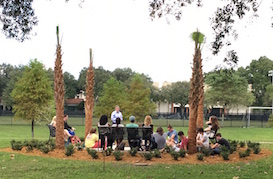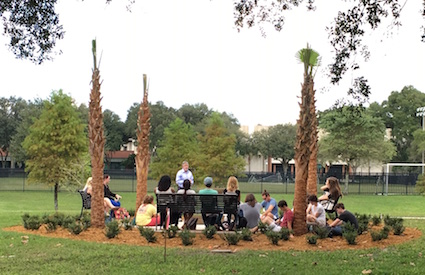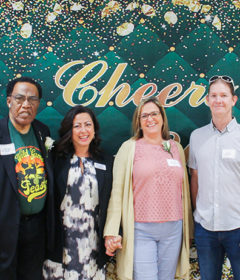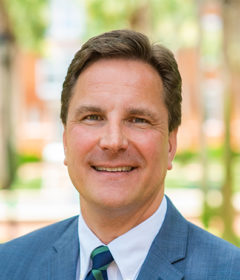Vietnam Remembrance Site to be dedicated during Homecoming


“Telling stories seemed a natural, inevitable process, like clearing the throat. Partly catharsis, partly communication, it was a way of grabbing people by the shirt and explaining exactly what had happened to me,” wrote Tim O’Brien, Vietnam veteran, in his book The Things They Carried, on why it was important for him to write.
Vietnam is one of the most hotly debated wars in American history because of the divide in public opinion on whether or not our country’s involvement was necessary. However, this discontent with the government has caused many of us, even decades later, to ignore the brave people who fought the war for us anyway, even if they did not want to go. The hardships they faced deserve to be honored, and Stetson plans on welcoming back the alumni who are Vietnam veterans with two special dedications to their service and a theatrical production.
On Wednesday Nov. 11, at 9 a.m. in front of the Carlton Union Building, Stetson University and the Stetson Student Veterans Organization invite all to join for the official opening and dedication of the new central campus flag space and the Veterans Memorial Plaque and Brick Path to celebrate Veterans Day.
On Saturday Nov. 14, at 11 a.m., in the space just north of Griffith Hall, everyone is welcome to attend the dedication of the recently constructed Vietnam Remembrance Site that honors all Stetson alumni who served in the military during the Vietnam era to show support for these veterans.
Later that evening, at 8 p.m., and on Sunday Nov. 15, at 3 p.m. in the Second Stage Theatre in the Museum of Art, 600 N. Woodland Blvd., Stetson will host the theatrical production, Reflections on Vietnam: An Oral History Performance, which uses letters and interviews of soldiers, nurses and families heavily involved in the Vietnam War. Tickets are free and cultural credit will be offered to undergraduate students who attend.
Julia Schmitt, Ph.D., director of Theatre Arts, is overseeing the readers’ theatre production of Reflections on Vietnam: An Oral History Performance. “I’m really grateful that several Stetson alumni that served in the Vietnam War have been gracious enough to share several of their personal letters with us,” Schmitt said. “We’ve included a few of those letters in our performance, and I believe it has enabled the cast to feel even more invested in this production because they’ve been able to connect with alumni in such a profound way.”
Grady Ballenger, Ph.D., professor of English, is helping his students empathize with Vietnam veterans by assigning The Things They Carried to his Reading Narrative class just before these commemorative Homecoming events take place on campus. His class was the first to be held at the Vietnam Memorial Remembrance Site where each student read and discussed excerpts from The Things They Carried.
“It’s time to honor all those students and alumni who left their studies or their families and careers to serve their country,” Ballenger said. “And it’s time to bring the lessons of Vietnam home to a new generation of students through our library archives of Stetson veteran stories, course assignments like Tim O’Brien’s The Things They Carried and theatrical productions like Reflections on Vietnam: An Oral History Performance.”
Susan Ryan, dean of the duPont-Ball Library, has led a talented team of librarians in developing a Vietnam Memorial website with veteran biographies, photographs and other resources. Ryan is the curator of the Max Cleland Collection housed in the library which includes photos, papers and political and military memorabilia.
“Max Cleland is a Stetson alumnus, class of 1964, who went to Vietnam and lost both his legs and his right arm,” explained Ryan. “He came home to a year of rehabilitation and then went on to an amazing political career, including serving as the head of the Veterans Administration under President Carter, as a United State Senator, and currently as the Secretary of the American Battle Monuments Commission under President Obama. My time spent with Max, and learning about his Vietnam experiences, have strengthened my interest in not letting this war and these veterans be forgotten.”
Jay Mechling ’67, B.A. in American Studies, received a student draft deferral for the Vietnam War during his time at Stetson, which allowed him to go on to graduate school and earn his Ph.D. in American Civilization in 1971, then spend 38 years teaching American Studies at the University of California, Davis.
“As an American Studies professor, around 2004, I became concerned that, without a draft, my students could ignore the fact that people their age were serving and dying in Iraq and Afghanistan,” Mechling said. “So I created and taught until my retirement a course entitled ‘War in American Memory.’ I taught many war memoirs, including those from Vietnam, such as Tim O’Brien’s The Things They Carried.”
Mechling is responsible for the Vietnam Remembrance Site becoming a reality once he noticed that Elizabeth Hall had a plaque that honored World War II veterans, but no place on campus honored Vietnam veterans specifically. Working closely with Ballenger, Mechling started a fundraising campaign that raised over $20,000 for the project. Mechling’s dedication to honoring veterans extends past Stetson, as he is currently proposing a grant to the National Endowment for the Humanities as an advisor for a multi-media public humanities project which aims to focus on helping veterans returning from the current wars, especially those suffering from PTSD.
Richard Swartz ’68, Vietnam veteran, was one of two ROTC students who went through a flight training program and earned a private pilot’s license and a sure entry into the U.S. Army Flight Program, but ended up being assigned to the infantry branch.
“In March of 1970, with Peter, Paul and Mary’s ‘Leaving on a Jet Plane’ playing in my mind, I began the longest trip of my life, and not just in miles,” said Swartz. “Traveling through California, Honolulu and Guam on an American Airlines charter, I arrived during the dead of night at Ton Son Nhut Air Base near Saigon. For those who have seen that opening scene from Platoon, my experience was just as portrayed in the movie.”
“Compared to most of my unit, I was an old guy at 23 years old,” Swartz said. “I was in II Corps and flew daily up and down the coast between Nha Trang and Qui Nhon and into the Central Highlands of An Khe and Pleiku. My flying days and the intensity level varied, but overall I was very lucky and returned from my year-long tour with both a sound mind and body.”
Swartz went on to be awarded the Distinguished Flying Cross, Bronze Star and Air Medal after his one-year tour. He returned home to a loving wife who helped him readjust to American life and was lucky enough to be received mostly positively.
“I was really fortunate when I returned from Vietnam,” Swartz said. “I never experienced the very vitriolic return that many did, although I did sense the ambivalence that even friends had of the war and my service in it. Over the years those sentiments changed and people who had opposed the war, and those of us who served, came to realize that we served our country and should not be judged harshly for that service despite their feelings about the war and the politicians who led us into it. I think the more recent conflicts in Iraq and Afghanistan cemented the view that you could, and perhaps should, oppose those wars while supporting the young men and women who served in the armed services,” Swartz said.
“The typical response from a veteran returning from Vietnam was to put those memories in a package tucked deep, literally and figuratively, in the back of a closet, never to be spoken of again,” said Mechling. “Most thought they would never see their service acknowledged by the institution they loved. We are so happy to be able, these many years later, to give them those long-overdue thanks.”
by Nicole Melchionda



